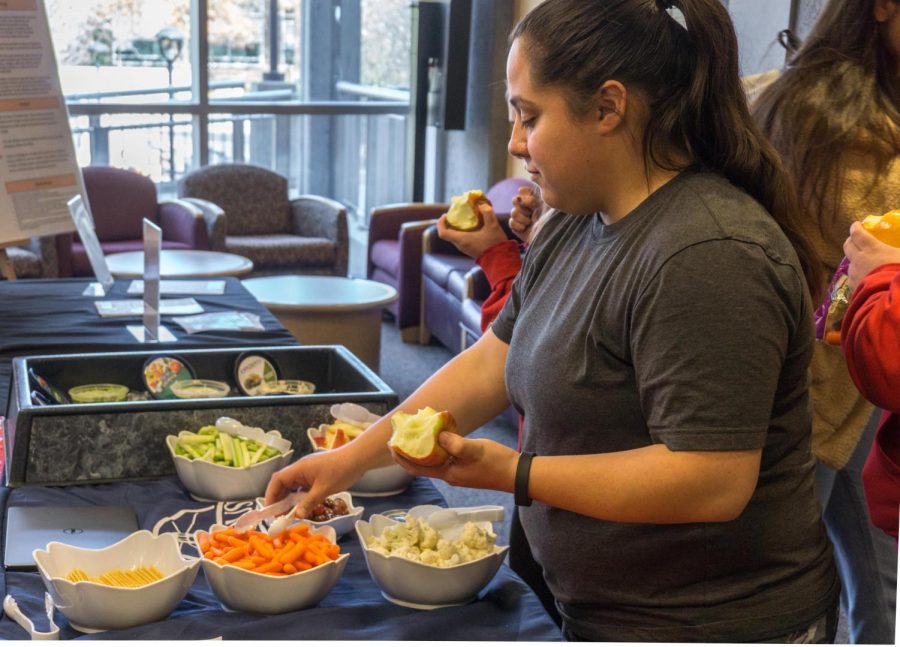EWU expands National Food Day celebration
EWU junior Maria Rivera enjoys free fruit and vegetables at the Real Food Fair in JFK Library. The fair had free food and hot apple cider for students to enjoy while learning about sustainability.
November 1, 2018
EWU lengthened its National Food Day celebration on campus this year to teach students the value of eating healthier and more sustainable diets while showing its efforts to reduce the school’s environmental impact.
EWU’s manager of Nutrition and Sustainability Dining Services Natalie Stine said she wanted students this year to understand the importance of creating a sustainable food system and helping with hunger and food insecurity.
For the past three years, EWU’s Office of Sustainability has partnered with EWU Dining Services and the Office of Community Engagement to celebrate National Food Day, a national campaign on Oct. 24 organized by the Center for Science in the Public Interest.
The Food Day campaign was launched in 2011 to encourage Americans to “eat real and support healthy, affordable food growth in a sustainable, humane way,” according to the CSPI’s campaign launch article.
Instead of the usual single-day celebration, events for National Food Day spanned from Oct. 22-24 with events to entertain, educate and assist students.
The activities this year included a pumpkin carving and compost how-to on Oct. 22, an informational event on the impact of plastic straws and a campus cleanup event on Oct. 23, and a food fair and panel discussion on Oct. 24.
On National Food Day, students passed through the library with bags of apples in hand from the pop-up food pantry hosted by the Office of Community Engagement, stopping at informational tables on food and sustainability. Some students stopped for the free apple cider, others to complete assignments for environmental science classes.
“We came here to figure out different food stuff around school and learn about different opportunities and resources we have here around school,” EWU freshman Makenna Nance said. “So far I’ve learned about compost and what composting does for our community at Eastern.”
Spokane County’s Master Composter and Recycler Program tabled at the Real Food Fair, an informational National Food Day event held in JFK Library, and taught students about the different composting methods available to them. Worm composting and a pre-composting method called Bokashi were featured.
EWU’s Environmental Sustainability Club tabled at the event with a mix and match game to teach students about sustainability issues like environmental degradation, climate change and hunger.
“Currently we’re focusing on education but we’re trying to get into initiatives, so activism and volunteering on campus,” club vice president and EWU senior Marisa Elsinghorst said.
National Food Day ended with a panel discussion on “The Good Food Revolution” written by Will Allen. The panel encouraged students to think locally about their food purchases, globally about its effects, and to learn more about the workers and production processes of the foods they purchase.
“I’ve seen a lot of students engaging in conversation,” Stine said. “I think half of the battle is just awareness and knowing, because you can’t really do anything if you don’t know what to do or what the right thing to do is. I think just the education piece is going to ignite some change.”








